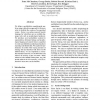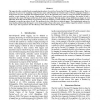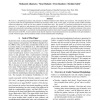124
click to vote
NAACL
2010
14 years 12 months ago
2010
We are interested in diacritizing Semitic languages, especially Syriac, using only diacritized texts. Previous methods have required the use of tools such as part-of-speech tagger...
120
click to vote
EMNLP
2010
15 years 1 days ago
2010
We define a probabilistic morphological analyzer using a data-driven approach for Syriac in order to facilitate the creation of an annotated corpus. Syriac is an under-resourced S...
137
click to vote
ACL
2006
15 years 3 months ago
2006
We present MAGEAD, a morphological analyzer and generator for the Arabic language family. Our work is novel in that it explicitly addresses the need for processing the morphology ...
115
click to vote
LREC
2008
15 years 3 months ago
2008
We discuss a named entity recognition system for Arabic, and show how we incorporated the information provided by MADA, a full morphological tagger which uses a morphological anal...
117
click to vote
EMNLP
2008
15 years 3 months ago
2008
We propose a novel lexicon acquirer that works in concert with the morphological analyzer and has the ability to run in online mode. Every time a sentence is analyzed, it detects ...
104
click to vote
LREC
2010
15 years 3 months ago
2010
This paper describes a method based on morphological analysis of words for a Persian Part-Of-Speech (POS) tagging system. This is a main part of a process for expanding a large Pe...
114
click to vote
LREC
2010
15 years 3 months ago
2010
Morphological analyzers and part-of-speech taggers are key technologies for most text analysis applications. Our aim is to develop a part-of-speech tagger for annotating a wide ra...
107
click to vote
LREC
2010
15 years 3 months ago
2010
Resource-poor languages may suffer from a lack of any of the basic resources that are fundamental to computational linguistics, including an adequate digital lexicon. Given the re...
101
click to vote
LREC
2010
15 years 3 months ago
2010
MAGEAD is a morphological analyzer and generator for Modern Standard Arabic (MSA) and its dialects. We introduced MAGEAD in previous work with an implementation of MSA and Levanti...
123
click to vote
LREC
2010
15 years 3 months ago
2010
In this paper we use statistical machine translation and morphology information from two different morphological analyzers to try to improve translation quality by linguistically ...



